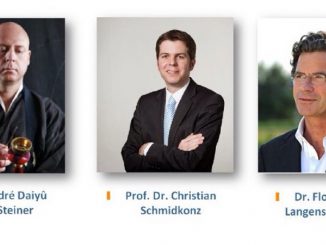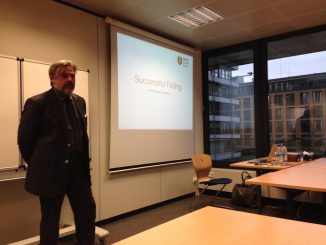
What should I do to optimize my studies? How do I find a good job after my graduation? What is it that I should start with at this point already to get a head start after the graduation? As professors, we hear such questions repeatedly, in particular from students in the first semesters. All these questions are justified, but there are no clear-cut, one-fits-all and fast answers. Just as each person has his or her very personal definition on what “success” is, “a good job” also means something different to different people.
Some time ago, I’ve started to ask my students at the end of their study program what their advice to new students would be when looking back to their completed course of study: What would they repeat in exactly the same manner? What would they do differently? What tips and tricks do they have in store? These recommendations are very rarely related to the choice of subjects or business concentrations, which – at first glance – is certainly a bit surprising. Much rather, our graduates share “wisdom” and hints about what made their studies (and off-campus life) more worth-while.
In the following, allow me to present the seven best of these recommendations – complemented by my own experience.
Passion is everything
Warren Buffett, Steve Jobs and other outstanding personalities of our times were firmly convinced: Only what is tackled and realized with passion will lead to success. Something that is neither fun nor fulfilling will never be rewarded by success or happiness. Steve Jobs made this impressively clear in his 2005 speech at Stanford University: “The only way to succeed is to love what you do. Keep looking, do not settle.”
In this context, we often hear the following statement from students: “I am glad that I did this internship, or chose this module or this elective. Now, at least, I know what I don’t like, and what I don’t want to do.” To find one’s passion, I recommend giving various trends and tendencies of the specific academic field a try, in particular at the very start of the studies.
No risk – no fun – no success
Having self-confidence is not easy – in particular at the beginning of the academic studies: Will I be able to complete my project work with excellent grades at this stage already? Am I qualified for this internship at all? Do I have sufficient command of a foreign language for the semester abroad?
Natalie Portman, actress, Oscar winner and Harvard graduate, addressed the issue when in May 2015 she was a guest speaker at her former university. Her firm belief: Young students should understand that their inexperience is an opportunity, not in the sense of taking incalculable risks; but as the willingness to go beyond one’s own comfort zone and to take risks that will finally ensure success.
Outlining this in detail by her own example, the leading role in “Black Swan”, for which Natalie Portman was awarded the Oscar, she explained: “Had I known how miserably unprepared I was for the movie’s ballet scenes, I would never have accepted the role. But this adventure led to one of my life’s greatest professional and personal successes.”
Apply the 80/ 20 rule
Obviously, a successful student is also defined by good and excellent grades. The grades reflect acquired skills and knowledge and their application in a test situation – sometimes more, sometimes less. That is a good thing.
But students often refer to the 80/ 20 rule as far as preparing for exams and obtaining the required grades are concerned. The so-called Pareto principle says that about 80 percent of a result can be attributed to 20 percent of the effort. Consequently, each additional percent is achieved only by far greater effort (decreasing marginal return). Students often observe that they are able to acquire 80 percent of their good results by 20 percent of learning effort. To get the remaining 20 percent, they have to “learn around the clock” – which, in hindsight, most of them would not do again.
Swimming against the tide
At the beginning of studies we, as lecturers, often hear our students say: “All my fellow-students do it like this.” As a consequence, many students apply for the same internship positions or the same partner universities abroad. But often, the very students who chose a different path – an internship at an allegedly unattractive employer or a stay in a country not so popular for student exchange – tell us about the most amazing adventures and experiences.
Others do not get to experience such things because they stick with “mainstream” activities. In this regard, my recommendation can only be: Dare to be exotic!
This advice also applies to individual lectures or seminars: There is nothing more boring than a lecture and case study discussion where the lecturer and all students are in total agreement. Controversial discussions and “off-road” opinions, however, often provide added value for all and bring up additional suggestions and ideas which, perhaps, at first sight seem unrealistic, but at a second glance are more innovative and feasible on top. In this context, it is better to apply once more the “Why, for what reason and to what end?”, if you fail to understand theses and opinions or if you have a different viewpoint. Curiosity and fancifulness do pay off! Looking deeper boosts new knowledge and insights.
Have a break
From our students, we often hear this phrase: “Last night, I completed my last presentation for this semester. Once I’ve done it tomorrow, I would like to start my thesis with you the day after tomorrow.” Of course, this reveals a student’s exceptional ambition and great discipline, which are both remarkable and positive.
On the other hand, such an approach keeps students from sorting out their thoughts, gaining new energy and relaxing between projects. But these are essential prerequisites to successfully implement a new project. Hence our advice: A really good plan for various (student) projects also includes breaks for holidays, leisure and perceived “inaction”.
Work hard, party hard
One thing is clear: Successful studies take much effort, hard work and labor. Projects may seem like huge mountains which the student seems unable to conquer. Hard work is one factor of success; yet another are the networks that students set up during their studies. In a professional context, these could be contacts for an internship, an interesting project or employment directly after graduation.
Such contacts are also found outside the lecture halls: Many students report of mentors or supporters they met at practice-related discussions, info events with companies or at student parties – it all comes down to the motto: “Work hard, party hard.” Mentors, in turn, can give access to their networks and provide excellent exchange and learning opportunities.
Putting internationality into practice
Openness has many aspects. Important facets often addressed by our students are openness to other cultures and to other opinions and mentalities. This is perceivable, for example, in the students’ routine in the lecture halls, in (international) team work and especially during the students’ semesters abroad. It’s amazing how, in the course of their studies, students become able to accept other perspectives, mentalities and opinions as equivalent to their own and try to generate an added value from the entire specter of possible points of view.
This is made obvious in particular when many students of different nationalities attend a lecture or students return to MBS from their semester abroad. This aspect not only generates improved results, but personal intercultural competence for each student. Thus, the often-heard summary of our students is: “The contact with many nationalities and cultures sustainably influenced me favorably during my studies. I would repeat it like this or even intensify contacts.”
Do you have any advice or recommendations on how to studies more successful? We look forward to your suggestions in the comments section.





